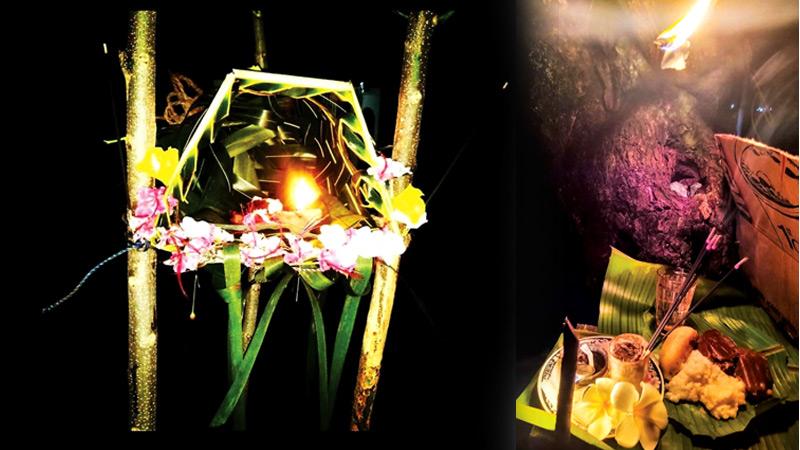
In various parts of Sri Lanka, a number of rituals is performed for God during the month of Esala (July). Among these, most of the offerings are made to the gods Kataragama, Vishnu, Pattini and Devol in the Southern Province and it can be identified that these rituals have been going on for centuries. In this background, this article describes such a ritual which is unique to the Southern Province, which is conducted in the Esala month.
On the night of the Esala Full Moon Poya Day, the light of the oil lamps in front of almost every house in the Balapitiya area is sure to be a spectacular sight.
After passing the Benthara area on the Galle - Colombo highway, oil lamps can be seen lit in front of houses on both sides of the road from Induruwa to Ambalangoda and from there to Rathgama and Boossa.
Esala Poya Day, is also known as Kiripoya and in the Balapitiya area, it is known as “Del Poya”. It is called “Del Poya” as it is not allowed to eat meat and fish after performing the Esala Poya rituals, and a breadfruit (Del) curry is prepared with rice.
 It is said that this is a religious festival held on the night of Esala Poya Day in the homes of many people in the coastal areas of the country and is in honour of the God Kataragama.
It is said that this is a religious festival held on the night of Esala Poya Day in the homes of many people in the coastal areas of the country and is in honour of the God Kataragama.
This religious practice, which has been going on for generations, is also known as “Joraa Mareema”. It is assumed that “Joraa Mareema” stands for the meaning “consuming milk as much as someone likes”.
This ritual begins with a custom named “Pe geta yaama or “Pe pael yaama”.
It is performed by the person in charge of the Devalaya in the area by staying at the Devalayas on Wednesdays or Saturdays, about a week before the Esala Poya. They usually return to their homes only after the conclusion of the final ritual and during the stay at Devalaya, they clean the premises first. Also, when they are leaving the houses for Devalayas, notices are pasted in public places to inform the people and during their stay, the villagers avoid preparing oily food and grinding of flour.
Before going to the Devalaya, the people have a bath and applies a sliced lime on the forehead. They then place coins on a leaf according to the number of members in their household.
The coins are also washed using lime and turmeric after which the coins are being offered to Devalayas. When performing the offering of coins, the people ask to in voke the blessings of God Kataragama to cure all diseases and to let them perform the religious rites held at their homes on the day of Esala Poya without any danger.
 Thereafter, on the eve of Esala Poya day, all the villagers clean their houses and it is considered to be a mandatory part of this ritual. There the seawater is brought in and used to clean the floor. In addition, a small shrine room is built using coconut leaves facing the main entrance to the house and it’s base is decorated with sand obtained from beaches.
Thereafter, on the eve of Esala Poya day, all the villagers clean their houses and it is considered to be a mandatory part of this ritual. There the seawater is brought in and used to clean the floor. In addition, a small shrine room is built using coconut leaves facing the main entrance to the house and it’s base is decorated with sand obtained from beaches.
On the evening of the Poya Day, the people prepare a confectionery called Kiriya using a mixture of rice flour, honey, jaggery and coconut milk.
At the same time milk rice is prepared they do not even taste these food. The milk rice and Kiriya are then kept in a container made of banana leaves and placed on in the shrine room made of coconut leaves, where flowers, incense sticks and oil lamps are also offered.
Following this performance, a lady of the house, usually the mother, distributes the milk rice and Kiriya to the family members sitting on mats in living room using a banana leaf. There, a banana leaf is reserved even for members who are not at home. If the amount of food distributed to someone is not enough, it can be expressed by saying, “Karunawayi (with kindness)”.
On the night of the Poya Day, the boys walk around the village to steal milk rice and “Kiriya” kept in the shrine room made of coconut leaves outside the houses. The youth in the household are trying to prevent the theft somehow. However, even if those who do so are caught, there are no conflicts and they are merely enjoying the activities.
There after the people go to the Devalaya and offer Kiriya, Kiribath, and other sweetmeats and fruits and ask blessings from God. Even after this ritual, fish, meat and similar food are not cooked at homes for three days. Almost every household in the area cooks milk rice and other food, but they exchange the food with neighbours and relatives.
